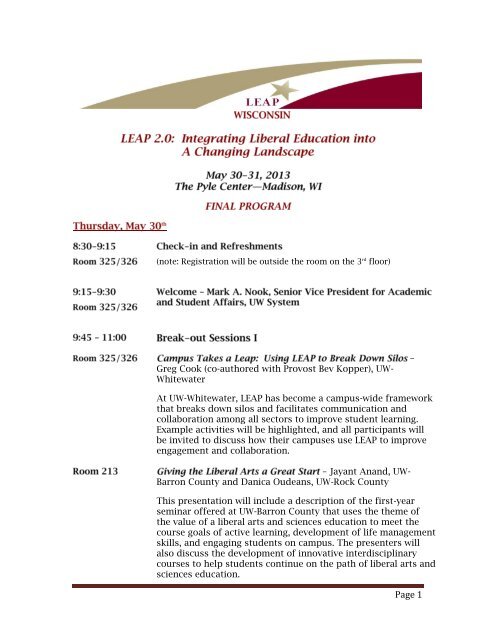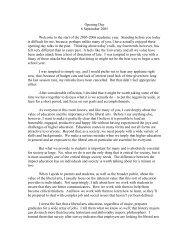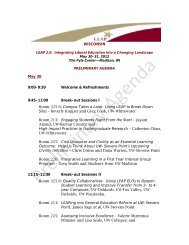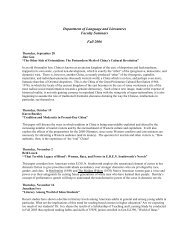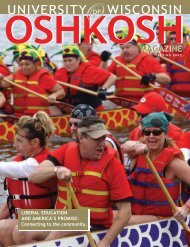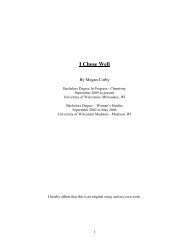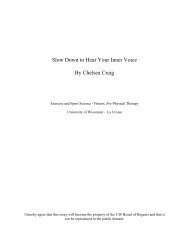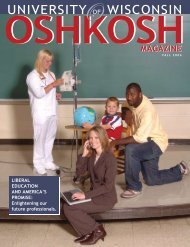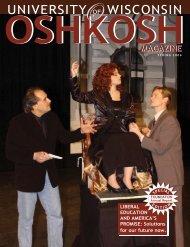NOW AVAILABLE Final Program for LEAP 2.0 Conference - Liberal ...
NOW AVAILABLE Final Program for LEAP 2.0 Conference - Liberal ...
NOW AVAILABLE Final Program for LEAP 2.0 Conference - Liberal ...
Create successful ePaper yourself
Turn your PDF publications into a flip-book with our unique Google optimized e-Paper software.
(note: Registration will be outside the room on the 3 rd floor)<br />
Greg Cook (co-authored with Provost Bev Kopper), UW-<br />
Whitewater<br />
–<br />
At UW-Whitewater, <strong>LEAP</strong> has become a campus-wide framework<br />
that breaks down silos and facilitates communication and<br />
collaboration among all sectors to improve student learning.<br />
Example activities will be highlighted, and all participants will<br />
be invited to discuss how their campuses use <strong>LEAP</strong> to improve<br />
engagement and collaboration.<br />
– Jayant Anand, UW-<br />
Barron County and Danica Oudeans, UW-Rock County<br />
This presentation will include a description of the first-year<br />
seminar offered at UW-Barron County that uses the theme of<br />
the value of a liberal arts and sciences education to meet the<br />
course goals of active learning, development of life management<br />
skills, and engaging students on campus. The presenters will<br />
also discuss the development of innovative interdisciplinary<br />
courses to help students continue on the path of liberal arts and<br />
sciences education.<br />
Page 1
Chris Cirmo and Dona Warren, UW-Stevens Point<br />
This session will provide a brief review of the background of<br />
UW-Stevens Point‘s upcoming civil discourse initiative, present<br />
the conceptualization of civil discourse that will guide the<br />
initiative, and note how this conceptualization might align civil<br />
discourse with <strong>LEAP</strong> Essential Learning Outcomes and guide the<br />
development of learning activities. Significant time will be<br />
devoted to gathering the insights, ideas, and suggestions of<br />
session participants and to exploring possibilities <strong>for</strong> future<br />
inter-institutional collaboration around the topic of civil<br />
discourse.<br />
– Greg Smith, Sangay Sirleaf, and Brian Cole,<br />
UW-Madison<br />
The First Year Interest Groups (FIGs) learning community<br />
program at UW-Madison is an example of a high impact practice<br />
in which <strong>LEAP</strong>‘s Essential Learning Outcomes are fundamental.<br />
This panel presentation will provide examples of FIGs,<br />
summarize assessment results, and describe strategies the<br />
program uses to assess integrative teaching and learning.<br />
However, the primary focus of this presentation will be on the<br />
experience of students. Student panelists will discuss the<br />
impacts of their FIGs experiences in terms of the Essential<br />
Learning Outcomes, especially integrative learning.<br />
Chan and Simone Devore, UW-Whitewater<br />
– Catherine<br />
We will discuss the <strong>LEAP</strong> Essential Learning Outcomes students<br />
acquire as a result of participation in undergraduate research,<br />
and how we can use this in<strong>for</strong>mation to further promote this<br />
practice and secure necessary resources from the university<br />
administration.<br />
James Sage, Nancy LoPatin-Lummis, and Paula DeHart,<br />
UW-Stevens Point<br />
,<br />
Inspired by AAC&U‘s <strong>LEAP</strong> initiative, UW-Stevens Point initiated<br />
a six-step, campus-wide revision of general education that was<br />
deliberate, transparent, and inclusive. Our new General<br />
Education <strong>Program</strong> is based on measurable learning outcomes,<br />
Page 2
it is organized around four levels to support developmental<br />
learning, it integrates high impact educational practices, and it<br />
utilizes a continuous improvement model of authentic<br />
assessment.<br />
– Lisa Seale, UW<br />
Colleges and Valerie Murrenus Pilmaier, UW-Sheboygan<br />
Following the lead of the American Association of Colleges and<br />
Universities and UW System Administration, the UW Colleges<br />
Assessment <strong>Program</strong> embarked on creating a proficiency<br />
(student learning outcome) that assesses some aspects of<br />
Inclusive Excellence in the curriculum, as students move into a<br />
more globalized world; this presentation will follow the journey<br />
toward creating this new proficiency, including the critical<br />
academic and political debates that attended the process<br />
involved in crafting it, specifics of the proficiency itself, and<br />
plans <strong>for</strong> using the data collected in assessing it. The<br />
presentation will include a discussion period in which other<br />
institutions that have utilized data obtained by assessing their<br />
Inclusive Excellence ef<strong>for</strong>ts can share their challenges and<br />
successes, particularly in regard to ―closing the loop‖ on their<br />
projects.<br />
– Liz Hachten, Marilyn Durham, and Giuliana<br />
Miolo, UW-Whitewater<br />
This panel presentation explores various dimensions of the<br />
four-year old Writing Matters project at UW-Whitewater, a<br />
faculty-driven initiative that has provided a fruitful framework<br />
<strong>for</strong> advancing <strong>LEAP</strong> and improving student writing in general<br />
education and major programs across campus.<br />
Griffith, UW-Superior<br />
– Eri Fujieda and Suzanne<br />
This presentation discusses how a multi-faceted approach to<br />
liberal arts education can help reshape student learning<br />
experiences and refocus the institutional attention to<br />
integration of engaging pedagogies and on-going assessments.<br />
Page 3
– Nancy Westphal-Johnson, Jolanda Vanderwal<br />
Taylor, Christopher Olsen, and Wren Singer, UW-Madison<br />
<strong>LEAP</strong> at a large research university: How the essential<br />
learning outcomes in<strong>for</strong>m and anchor our work in times of<br />
change.<br />
Stone, UW-Whitewater;<br />
– Greg Cook and John<br />
UW-Whitewater created a campus-wide committee that reviews<br />
assessment data related to the <strong>LEAP</strong> essential learning<br />
outcomes and makes recommendations to improve teaching,<br />
learning, and assessment. Presenters will describe how this<br />
committee operates and will also invite participants to share<br />
similar stories from their campuses.<br />
– Joan Littlefield Cook,<br />
Barbara Bren, Jolly Emrey and Christa Lebens, UW-Whitewater<br />
UW-Whitewater has assessed critical thinking and<br />
in<strong>for</strong>mation literacy skills and perceptions over the past<br />
several years using both nationally normed and locally<br />
developed assessments. This presentation will summarize<br />
these data, identify student strengths and weaknesses, and<br />
offer recommendations <strong>for</strong> instruction and assessment<br />
activities.<br />
Parkside<br />
Lori Allen, James Robinson and Dennis Rome, UW-<br />
<strong>LEAP</strong> allowed program-level learning goals and outcomes to be<br />
stated and assessed. From assessment, program-wide initiatives<br />
to improve consistency and an integrated learning experience<br />
targeting underprepared students were developed. This session<br />
will provide attendees with the details of our assessment work,<br />
the impact of the resulting initiatives, and invite conversations<br />
about other approaches to general education assessment and<br />
improvement.<br />
Page 4
– Lori Carrell, Tracy Slagter, Mollie Merrill, Michael<br />
Lueder, Carleen Vande Zande and Mehgan Clark, UW-Oshkosh<br />
How did a UW System campus that hadn‘t had change in its<br />
general education coursework and culture in 40 years use ‗<strong>LEAP</strong>‘<br />
to launch a dramatic and historic re<strong>for</strong>m In this panel,<br />
students, faculty, and staff from UW Oshkosh will describe the<br />
trans<strong>for</strong>mative process that began in 2007 and will be<br />
implemented as the new University Studies <strong>Program</strong> in Fall<br />
2013.<br />
Debra Humphreys, Vice President<br />
<strong>for</strong> Policy and Public Engagement, Association of American<br />
Colleges & Universities (AAC&U)<br />
Introduced by Mary Pinkerton, UW-Whitewater<br />
Debra Humphreys, long-standing leader in AAC&U‘s work on<br />
quality through liberal education, will present her reflections on<br />
the history of the <strong>LEAP</strong> initiative—its original goals in Wisconsin<br />
and around the nation, and its emerging new priorities. She will<br />
provide an assessment of the current national dialogue on the<br />
future of higher education and the role <strong>LEAP</strong> national and<br />
campus leaders play in influencing that dialogue and steering it<br />
in more productive directions. She will also provide a summary<br />
of new research on the changing nature of the economy and the<br />
continued and even increasing value of liberal education<br />
outcomes in the post-recession workplace. <strong>Final</strong>ly, she will<br />
provide some speculative thoughts about the future of <strong>LEAP</strong><br />
and of liberal education.<br />
Hosted by UW System President Kevin P. Reilly and including<br />
Recognition of the Student Recipients of the UW System‘s 2013<br />
<strong>Liberal</strong> Arts Essay Scholarship Competition<br />
Page 5
(note: Registration will be outside the room on the 3 rd floor)<br />
– Rovy Branon, Associate Dean, Online Learning and<br />
Technology, UW-Extension<br />
Introduced by Aaron Brower, Interim Provost, UW-Extension<br />
Formal educational institutions are beginning to grapple with<br />
the waves of innovation that have been disrupting other parts<br />
of society. Looking outside of education might give some<br />
clues about what is next. This session will explore some<br />
potential disruptive (and fun) technologies and provide<br />
perspective to separate hype from reality.<br />
Julianna Alitto,<br />
UW-Waukesha; Tricia Wessel-Blaski, Psychology<br />
and Education, UW-Washington County; Kim Kostka,<br />
UW-Rock County<br />
As part of the first cohort of Flex programs, UW Colleges<br />
faculty and staff will discuss the curricular development<br />
underway to convert multiple gateway courses into<br />
competency-based Flex offerings.<br />
– Brett Barker, UW-<br />
Marathon County; Chad Zahrt, UW-Milwaukee; Bill Keith, UW-<br />
Milwaukee (Tentative)<br />
Join several of the faculty leaders in Cohort I of UW Flex to<br />
hear how the faculty role is changing in the move to a<br />
competency-based model.<br />
Larry Graves, UW Colleges; Colleen Johnson, UW-Milwaukee;<br />
Beth Warner, UW-Milwaukee; and Jane Hojan-Clark, UW-<br />
Milwaukee<br />
Page 6
UW-Milwaukee and UW Colleges directors of admissions,<br />
financial aid, and bursar and registrar offices will address the<br />
complexity of moving from serving students in a credit-based<br />
system, to one that is competency-based: everything changes!<br />
Dave Clark, English; Doris<br />
Schoneman, Nursing; Shana Ponelis, In<strong>for</strong>mation Science and<br />
Technology; Phyllis King, Academic Affairs<br />
As part of the first cohort of Flex programs, UW-Milwaukee<br />
faculty and staff will discuss the curricular development<br />
underway in select programs at the institution.<br />
– Aaron Brower,<br />
UW-Extension; Ericca Pollack, UW-Milwaukee; Kristin Fillhouer,<br />
UW Colleges ;Toby Deutsch, UW-Milwaukee<br />
Join the advisors and others who are developing an innovative,<br />
wrap-around, and intrusive advising model that blends<br />
traditional academic and academic support roles to ensure the<br />
success of the adult students who enroll in UW Flex programs.<br />
– Terry Brown, UW System<br />
AAC&U's <strong>LEAP</strong> 1.0 essential learning outcomes were in<strong>for</strong>med<br />
by a 2006 survey of employers about skills that they believed<br />
the workers of today should have. Written and oral<br />
communication was at the top of their list. Last month,<br />
AAC&U released the results of its most recent survey of<br />
employers in which nearly all of the respondents said that the<br />
most important quality they are looking <strong>for</strong> is innovation. Are<br />
the current <strong>LEAP</strong> essential learning outcomes, specifically the<br />
intellectual and practical skills, sufficient <strong>for</strong> the kind of<br />
innovation that today's workplace demands<br />
This presentation will draw on inspiration from<br />
the artist and UW Madison professor Lynda Barry to re-think<br />
the <strong>LEAP</strong> essential learning outcomes in the context of the<br />
truly innovative, real and virtual, classroom.<br />
Page 7
A highly interactive session, including a panel discussion and<br />
audience participation facilitated by Debra Humphreys<br />
(AAC&U), with Greg Downey (UW-Madison), Vicki Washington<br />
(UW System), and Laura Pedrick (UW-Milwaukee).<br />
Introduced by Rebecca Karoff, Senior Special Assistant to the<br />
Senior Vice President <strong>for</strong> Academic and Student Affairs, UW<br />
System<br />
The panel will address:<br />
The impact of competency-based education on curricular<br />
integrity;<br />
Is this the end of the traditional university as we know it<br />
Flex and <strong>LEAP</strong>: What‘s Flex got to do with <strong>LEAP</strong> Is Flex<br />
coopting <strong>LEAP</strong><br />
What about Inclusive Excellence<br />
Page 8


